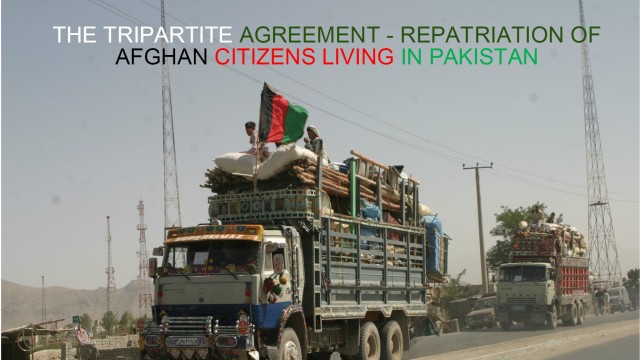The Tripartite Agreement – Repatriation Of Afghan Citizens Living In Pakistan
On May 7th, 2010, The Tripartite Agreement was signed in Lahore by the Islamic Republic of Pakistan, the Islamic Republic of Afghanistan and the United Nations High Commissioner for Refugees (UNHCR). The agreement governs matters relating to repatriation of Afghan citizens living in Pakistan.
Article 1 and 2 of the Agreement provide for the establishment and composition of the Tripartite Commission. The principal objective of the Commission is to ensure that safe conditions are present for the voluntary repatriation of Afghan citizens and their reintegration in Afghanistan. Article 9 safeguards the return of Afghan citizens without any fear of harassment, intimidation, persecution, discrimination, prosecution or any other punitive measures based on account of their having left, or remained outside of Afghanistan. Similarly under Article 10, Afghanistan accepts to recognize the legal and civil status, including all changes made in Pakistan with respect to the births, deaths, adoptions, marriage and divorce of Afghan citizens. Afghanistan shall also recognize the certificates, diplomas, academic and vocational skills obtained by Afghan citizens while they were in Pakistan. The interests of Afghan citizens are secured in the Agreement leaving Pakistan with a huge responsibility. The Agreement comes into play the moment an Afghan citizen consents for his or her voluntary return. The Agreement strives to resolve any issue that arises till the returnee exits Pakistan and settles in Afghanistan. Article 27 provides for the tenure and the mechanism for termination of The Tripartite Agreement. Originally, the parties decided that the Agreement would be valid till 31st December, 2012. Over the years, the parties have mutually agreed to extend the validity of the Agreement. The current version of the Agreement preserves the original preamble, terms, conditions and articles, and is valid till 31st December, 2016.
At the moment, nearly three million registered and unregistered Afghan refugees are living in Pakistan. The UNHCR and the international community urge Pakistan to not compel the refugees to leave. Pakistan has hosted refugees since the 1980s, so the new generation that has grown up in Pakistan does not even know what Afghanistan looks like. One cannot deny that since the 1980s Afghans have been born in Pakistan, attended schools, received academic and vocational skills and are now ready to contribute to the economy and development of Pakistan. Pakistan has the choice to keep the new generation or to allow them to move back to Afghanistan. Afghanistan must thank Pakistan for hosting the refugees, providing them with food and healthcare facilities and also, for shaping them into academically and vocationally skilled youth. This new generation is a huge asset for Afghanistan and so, the return of Afghan refugees should not be construed as a move of aggression. The refugees are educated and skilled as they have been able to get opportunities in Pakistan that were not available to them in Afghanistan at the time. Since the 1980s, Afghanistan has been stuck in some war or the other, from the Russian invasion to the Taliban regime and then the American attack. During this time, Pakistan helped pave avenues for the progress and development of the refugees. The refugees are very valuable to Afghanistan because of the opportunities they got in Pakistan.
It is important to note that the rights of Afghan refugees are secured until the Tripartite Agreement is in place. There are several benefits attached to the agreement, so it is in the best interest of the refugees to repatriate while the Agreement is valid. The refugees are Afghan citizens and their patriotism or love for Afghanistan should not be termed as treason in Pakistan. Pakistan has played a positive role and helped the refugees in trying times. Pakistan expects a friendly and favorable environment to help secure its interests in the region. We should give the Afghan citizens a chance to mend their bond with their homeland – a bond they were forced to break during the war.
The views expressed in this article are those of the author and do not necessarily represent the views of CourtingTheLaw.com or any other organization with which he might be associated.


